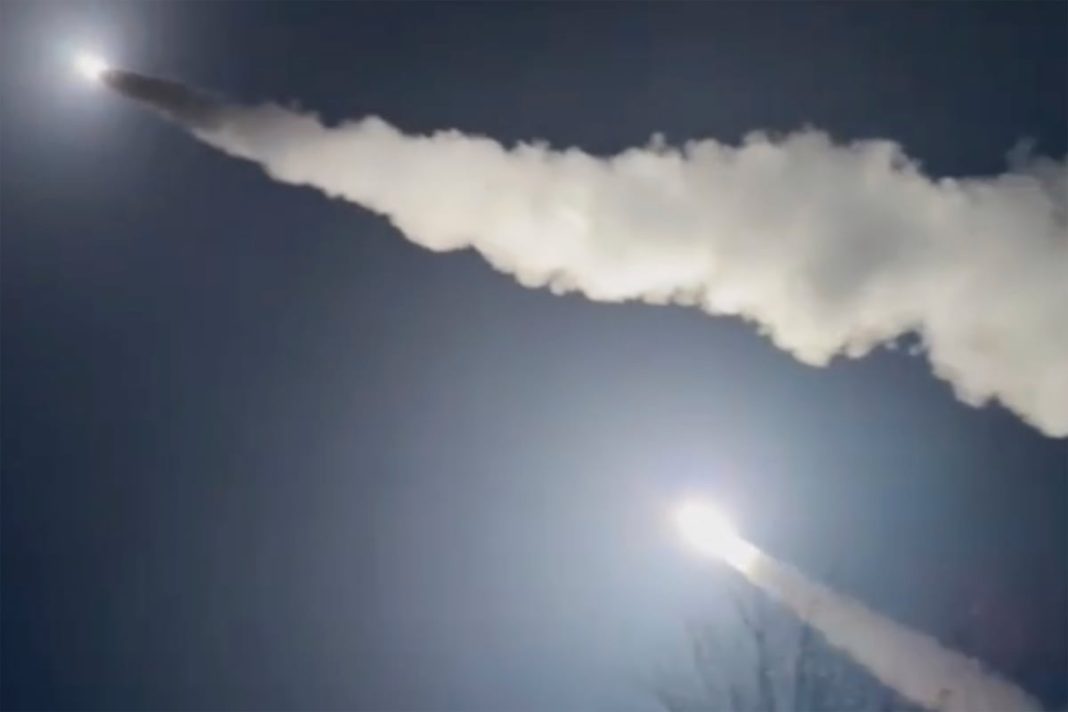KYIV, Ukraine — In a significant escalation of the ongoing conflict between Ukraine and Russia, Ukrainian forces have employed American-supplied longer-range missiles for the first time in nearly 1,000 days of warfare. This development follows an announcement from Russian President Vladimir Putin, who officially reduced the threshold for using nuclear weapons, suggesting that Moscow could consider a nuclear response to any conventional attacks supported by a nuclear power, including those from the U.S. to Ukraine.
Footage shared via a Telegram channel linked to the Ukrainian military purportedly shows the firing of Army Tactical Missile System (ATACMS) missiles from an undisclosed location within Ukraine. A U.S. official disclosed that approximately eight missiles were launched, with just two intercepted by Russian defenses. The missiles reportedly targeted an ammunition supply depot located in Karachev, a small city in Russia’s Bryansk region, which has a population of around 18,000. The U.S. government is currently analyzing the resultant damage from the strikes.
The timing of this military action raises alarms about an intensifying conflict that has strained international relations. Recently, U.S. officials expressed concerns about Russia’s decision to deploy troops from North Korea to bolster its military efforts in Ukraine. This comes against the backdrop of a controversial easing of restrictions by the U.S. concerning the ATACMS, coinciding with the 1,000-day mark of the conflict.
As the war reaches this milestone, analysts are scrutinizing its trajectory and potential resolutions, particularly with the impending inauguration of U.S. President-elect Donald Trump, who has indicated plans to swiftly conclude the conflict and has criticized the financial support the U.S. has extended to Ukraine.
Current assessments indicate that neither Russia nor Ukraine can sustain this level of conflict indefinitely; however, Russia possesses greater resources to prolong its military efforts. Ukrainian troops face intense pressure along a roughly 600-mile front line, with numerous incidents of Russian drone and missile strikes targeting Ukrainian civilians.
Amid shifting tactical dynamics, Ukraine claimed responsibility for the recent strike on a military weapons depot in the Bryansk region but did not acknowledge the use of ATACMS specifically. President Volodymyr Zelenskyy emphasized that Ukraine has developed long-range capabilities, including domestically produced drones and now the ATACMS.
In a contrasting statement, the Russian Defense Ministry asserted that it intercepted five ATACMS missiles and successfully caused a fire at a military facility from descending fragments, without reporting any casualties or damage. The credibility of claims from both sides remains unverifiable amid the chaos of warfare.
In other developments, Ukraine has faced a series of deadly strikes in recent days, including a drone attack in the northern Sumy region that resulted in the deaths of at least 12 individuals, including a child. This attack follows a deadly missile strike in the same region that killed 11 people and a subsequent missile barrage that claimed at least 10 lives in the southern port city of Odesa. Zelenskyy condemned these attacks, asserting that they reflect Putin’s commitment to continue the war and disregarding calls for peace.
Further complicating the situation, Zelenskyy reported the deployment of North Korean troops along Ukraine’s borders, with numbers expected to rise drastically. He recently presented a “resilience plan” during a session with Ukrainian lawmakers, designed to fortify defenses against ongoing Russian assaults. Although recognizing the shortage of manpower, the mobilization age remains unchanged.
Looking ahead, Ukraine aims to ramp up domestic production of long-range drones and missiles in an effort to reduce dependence on foreign military aid, with a target of manufacturing at least 30,000 long-range drones and 3,000 long-range missiles in the coming year. NATO Secretary-General Mark Rutte remarked on ongoing discussions among Western nations regarding additional support for Ukraine as the geopolitical landscape evolves.
On the international stage, European Parliament President Roberta Metsola marked the significant anniversary of the conflict, honoring the resilience exhibited by the Ukrainian people throughout these harrowing times. “Your people are an inspiration to all who value freedom around the world,” she asserted to Zelenskyy during a recent address.





